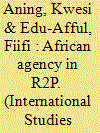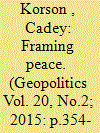|
|
|
Sort Order |
|
|
|
Items / Page
|
|
|
|
|
|
|
| Srl | Item |
| 1 |
ID:
145124


|
|
|
|
|
| Summary/Abstract |
Both the African Union (AU) and the Economic Community of West African States (ECOWAS) have been global leaders in embracing and operationalizing responsibility to protect (R2P). The adoption of the AU’s Constitutive Act, Article 4 (h) in 2000, has transformed its old-fashioned principle of noninterference to one of nonindifference. This authorizes the AU to intervene in Member States with respect to war crimes, genocide, ethnic cleansing, and crimes against humanity. ECOWAS has through its conflict prevention, management, and resolution protocol and its conflict prevention framework deepened and practicalized the notion of sovereignty as responsibility. These frameworks from both the AU and the ECOWAS have close similarities to the R2P norms. However, although these notions are captured in official documents, their actual operationalization faces challenges relating to sovereignty, limited institutional capacity, a restricted appetite for enforcement action, and a lack of explicit instruments to activate their intervention clauses in R2P-like situations. In spite of these challenges, the article argues that the initiatives of both the AU and the ECOWAS in Mali, Cote d’Ivoire, and Libya demonstrated a positively active African agency in contributing to global peace processes. This article, therefore, assesses the successes and limitations of African regional agency in enforcing R2P-like norms among its member states and its implications for and contributions to global international relations discourses.
|
|
|
|
|
|
|
|
|
|
|
|
|
|
|
|
| 2 |
ID:
138981


|
|
|
|
|
| Summary/Abstract |
Despite conducting sixty-six peacekeeping missions, the United Nations (UN) must repeatedly justify the necessity and wisdom of continuing these operations to the international community. Domestic success is contingent to a large degree on the willingness of citizens to cooperate with peacekeepers. Consequently, public perception in both the host country and abroad has become crucial to the continuation and maintenance of UN Peacekeeping Operations (UNPKO). A discourse analysis of domestic and international newspapers, radio transcripts, and television broadcasts about contemporaneous UNPKOs in Haiti and Côte d’Ivoire reveals staggering disparities. Diverging interpretations of mission mandates, violence, censorship, and colonial practices contribute to the way in which peacekeeping missions are perceived. This article identifies how current UNPKOs are perceived domestically and internationally and emphasises the role of these perceptions as a basis for evaluating and improving these operations.
|
|
|
|
|
|
|
|
|
|
|
|
|
|
|
|
|
|
|
|
|